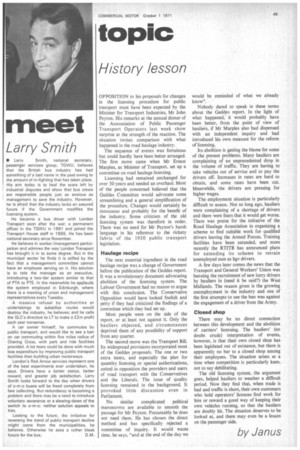topic
Page 51

If you've noticed an error in this article please click here to report it so we can fix it.
History lesson
OPPOSITION to his proposals for changes in the licensing procedure for public transport must have been expected by the Minister for Transport Industries, Mr John Peyton. His remarks at the annual dinner of the Assoociation of Public Passenger Transport Operators last week show surprise at the strength of the reaction. The situation invites comparison with what happened in the road haulage industry.
The sequence of events was fortuitous but could hardly have been better arranged. The first move came when Mr Ernest Marples, as Minister of Transport, set up a committee on road haulage licensing.
Licensing had remained unchanged for over 30 years and needed an overhaul. Most of the people concerned believed that the Geddes Committee would advocate some streamlining and a general simplification of the procedure. Changes would certainly be innocuous and probably for the benefit of the industry. Some criticism of the old licensing system was therefore in order. There was no need for Mr Peyton's harsh language in his reference to the rickety fabric of the 1930 public transport legislation.
Haulage recipe The next essential ingredient in the road haulage recipe was a change of Government before the publication of the Geddes report. It was a revolutionary document advocating abolition of the licensing system. The Labour Government had no reason to argue with this conclusion. The Conservative Opposition would have looked foolish and petty if they had criticized the findings of a committee which they had set up.
Most people were on the side of the report, or at least not against it. Only the hauliers objected, and circumstances deprived them of any possibility of support from any quarter.
The second move was the Transport Bill. Its widespread provisions incorporated most of the Geddes proposals. The one or two extra items, and especially the plan for quantity licensing or special authorizations, united in opposition the providers and users of road transport with the Conservatives and the Liberals. The issue of quality licensing remained in the background. It provoked little discussion even in Parliament.
No similar complicated political manoeuvres are available to smooth the passage for Mr Peyton. Presumably he does not need them. He has chosen the direct method and has specifically rejected a committee of inquiry. It would waste time, he says, "and at the end of the day we would be reminded of what we already know". • Nobody dared to speak in these terms about the Geddes report. In the light of what happened,' it would probably have been better, from the point of view of hauliers, if Mr Marples also had dispensed with an independent inquiry and had introduced his own measure for the reform of licensing.
Its abolition is getting the blame for some of the present problems. Many hauliers are complaining of an unprecedented drop in the volume of traffic. They are having to take vehicles out of service and to pay the drivers off. Increases in rates are hard to obtain, and some rates have been cut. Meanwhile, the drivers are pressing for higher wages.
The employment situation is particularly difficult to assess. Not so long ago, hauliers were complaining of a shortage of drivers and there were fears that it would get worse. There was praise for the initiative of the Road Haulage Association in organizing a scheme to find suitable work for qualified drivers leaving the Armed Forces. Training facilities have been extended, and more recently the RTITB has announced plans for extending its scheme to retrain Unemployed men as hgv drivers.
A few days later comes the news that the Transport and General Workers' Union was banning the recruitment of new lorry drivers by hauliers in (need it be said?) the West Midlands. The reason given is the growing unemployment in the industry and one of the first attempts to use the ban was against the engagement of a driver from the Army.
Closed shop There may be no direct connection between this development and the abolition of carriers' licensing. The hauliers' (no doubt crude) interpretation of events, however, is that their own closed shop has been legislated out of existence, but there is apparently no bar to a closed shop among their employees. The situation arises at a time when competition is particularly keen, not to say debilitating.
The old licensing system, the argument goes, helped hauliers to weather a difficult period. Now they find that, when trade is bad and traffic is short, their own customers who hold operators' licences find work for hire or reward a good way of keeping their own vehicles running, so that the hauliers are doubly hit. The situation deserves to be looked at, and there may even be a lesson on the passenger side.
by Janus


















































































































